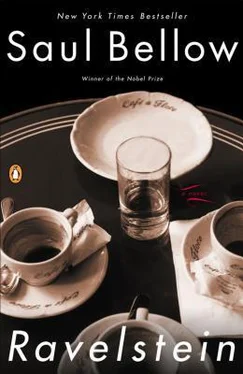He had gone over the heads of the profs and the learned societies to speak directly to the great public. There are, after all, mil lions of people waiting for a sign. Many of them are university graduates.
When Ravelstein's outraged colleagues attacked him, he said he felt like the American general besieged by the Nazis-was it at Remagen? When they demanded his surrender, his answer was "Nuts to you!" Ravelstein was upset, of course; who wouldn't have been? And he couldn't expect to be rescued by some academic Pat-ton. He could rely on his friends, and of course he had generations of graduate students on his side as well as the support of truth and principle. His book was well received in Europe. The Brits were inclined to look down their noses at him. The universities found fault, some of them, with his Greek. But when Margaret Thatcher invited him to Chequers for a weekend, he was _"aux anges"__ (Chequers was heavenly: Abe always preferred French expressions to American ones; he didn't say "a chaser" or "a womanizer" or "ladies' man"-he said _"un homme a femmes."__). Even bright young left-wingers were strongly for him.
At Chequers, Mrs. Thatcher called his attention to a painting by Titian: a rearing lion caught in a net. A mouse was gnawing at the cords to set the lion free. (Is that one of Aesop's fables?) This detail had been lost in the shadows for centuries. One of the greatest men of the century, the statesman Winston Churchill, with his own brushes had restored the mythic mouse.
When he returned from England, Abe told me all about it in his own parlor (a drawing room it was not). He had paintings of his own, done by minor but good French artists. Some were quite handsome. The largest was a Judith with the head of Holofernes, a very bloody picture. She's got Holofernes by the hair. His eyes are upcast, half closed, her look is calm, pure, and saintly. I sometimes think he never knew what hit him. There are worse ways to go. I would now and then ask Ravelstein why he had chosen _this__ painting to dominate the parlor.
"No particular statement is being made," he said.
"Everything we see we translate into Freud's language. Now, which is being trivialized, his vocabulary or our observations?"
"You can always refuse to be co-opted," said Ravelstein. He was not big on what Americans call "the visual arts." The canvases were there because walls were meant for paintings and paintings for walls. His apartment was luxuriously furnished, and the right pictures had to be hung. When the money began to come in he replaced all his "old" things. They weren't old at all. They were earlier, cheaper purchases. Even when he had no more than his university salary to live on he had bought expensive sofas, good Italian leather furniture on money borrowed from his friends. When he rose to the top of the best-seller list, he gave the old stuff away to Ruby Tyson, the black woman who came in twice weekly to wash up and do the dusting. He made the delivery arrangements for her of course, he paid for the trucking. He urgently needed the space and things couldn't be moved out fast enough to suit him.
I would say Ruby's duties were very light. She polished Ravelstein's silver, she washed the blue-and-white Quimper dinner service and the Lalique crystal plate by plate, glass by glass. She didn't do any ironing-his shirts were laundered by American Trustworthy Home-delivery Service. They cleaned his suits as well. He did lots of business with Trustworthy. All but his neckties. Those were sent via air express to a silk specialist in Paris.
New rugs and furniture continually arrived-all the replaced dining-room suites, china cabinets, bedsteads were probably handed on by Ruby to her daughters and grandchildren. She was a religious old woman, very formal Southern-style when she answered the telephone. She was a loyal presence in the household. He was perfectly clear about her and had no illusions about being ad mitted to intimacy, received into the soul of a respectable old black person. Besides she had worked in the university neighborhood for more than half a century and had much to tell him about the closets of academic households. She fed Ravelstein's appetite for gossip. He hated his own family and never tired of weaning his gifted students from their families. His students, as I've said, had to be cured of the disastrous misconceptions, the "standardized unrealities" imposed on them by mindless parents.
Certain difficulties of presentation arise here. You don't want to confuse Ravelstein with the campus "free spirits," common enough in my own student days. The job of such people was to make you aware of the bourgeois upbringing from which your education was supposed to free you. These liberated teachers offered themselves as models, sometimes seeing themselves as revolutionaries. They spoke youth gibberish. They wore ponytails, they grew beards. They were Ph. D. hippies and swingers.
Ravelstein had no such act-nothing you could easily imitate. You couldn't begin to be like him without study, without learning, without performing the esoteric labors of interpretation he had gone through under _his__ late master, the famous, controversial Felix Davarr.
I try at times to put myself into the shoes of a gifted young man from Oklahoma or Utah or Manitoba invited to join a private study group in Ravelstein's apartment, coming up in the elevator, arriving to find the door wide open and getting his first impressions of Ravelstein's habitat-the big antique (sometimes threadbare) Oriental carpets, the wall hangings, classical figurines, mirrors, glass cabi nets, French antique sideboards, the Lalique chandeliers and wall fixtures. The living-room sofa of black leather was deep, wide, low. The glass top of the coffee table in front of it was about four inches thick. On it, Ravelstein sometimes spread his effects-the solid-gold Mont Blanc fountain pen, his $20,000 wrist watch, the golden gadget that cut his smuggled Havanas, the extra-large cigarette box filled with Marlboros, his Dunhill lighters, the heavy square glass ashtrays-the long butts neurotically puffed at once or twice and then broken. A great amount of ashes. Near the wall on a stand, sloping, an elaborate many-keyed piece of telephone apparatus-Abe's command post, expertly operated by himself. It saw heavy use. Paris and London called almost as often as Washington. Some of his very close friends in Paris phoned to talk about intimate matters-sex scandals. Those students who knew him best tactfully withdrew when he signaled with the fingers below his cigarette. He asked keen, low questions, and when he was listening his bald head was often drawn back on the leather cushions, his eyes sometimes upcast, glazed with absorption, mouth falling slightly open-his feet in the loafers coming together sole to sole. At all hours he was playing Rossini CDs at top volume. He had an extraordinary fondness for Rossini and for eighteenth-century opera as well. Baroque Italian music had to be performed on the original ancient instruments. He paid top prices for his hi-fi equipment. Speakers at $10,000 apiece he did not consider too expensive.
Above him and below, three stories of the apartment building, like it or not, had to listen to Frescobaldi, Corelli, Pergolesi, to the "Italian Maiden in Algiers." When neighbors knocked to complain, he smiled and said that without music you couldn't swallow what life offered, and that it would do them good to submit and listen. But he promised to have more insulation blown in between the floors, and indeed he did bring in a soundproofing engineer. "I spent ten thousand on kapok insulation and still the rooms are not _insonoriseйs__." But when the neighbors were listed for him one by one there wasn't a single tenant he was able to care about. He annotated his reasons and was prepared to explain his grounds. He had a line on each of the neighbors-little bourgeois types dominated by secret dreads, each one a shrine of _amour propre__, scheming to persuade everyone else to endorse his image of himself; flat, reckoning personalities (a better term than "souls"-you could deal with personalities but to contemplate the souls of such individuals was a horror you wanted to avoid). Nothing to live for but foolishness, vain glory-no loyalty to your community, no love for your _polis__, devoid of gratitude, with nothing you would lay down your life for. Because, remember, the great passions are antinomian. And the great figures of human heroism looming tremendously over us are very different from the man in the street, our "normal" commonplace contemporary. Ravelstein's appraisal of the people he dealt with daily had this background of great love or of boundless rage. He would remind me that "rage" was in the first line of the _Iliad-menin Achileos__. Here you see the main, bearing beams of Ravelstein's deeply honest belief. The greatest heroes of all, the philosophers, had been and always would be atheists. After the philosophers, in Ravelstein's procession, came poets and statesmen. The tremendous historians like Thucydides. The military geniuses like Caesar-"the greatest man who ever lived within the tides of time"-and, next to Caesar, Marc Antony, briefly his successor, "the triple pillar of the earth" who valued love above imperial politics. Ravelstein went for classical antiquity. He preferred Athens but he respected Jerusalem greatly.
Читать дальше












